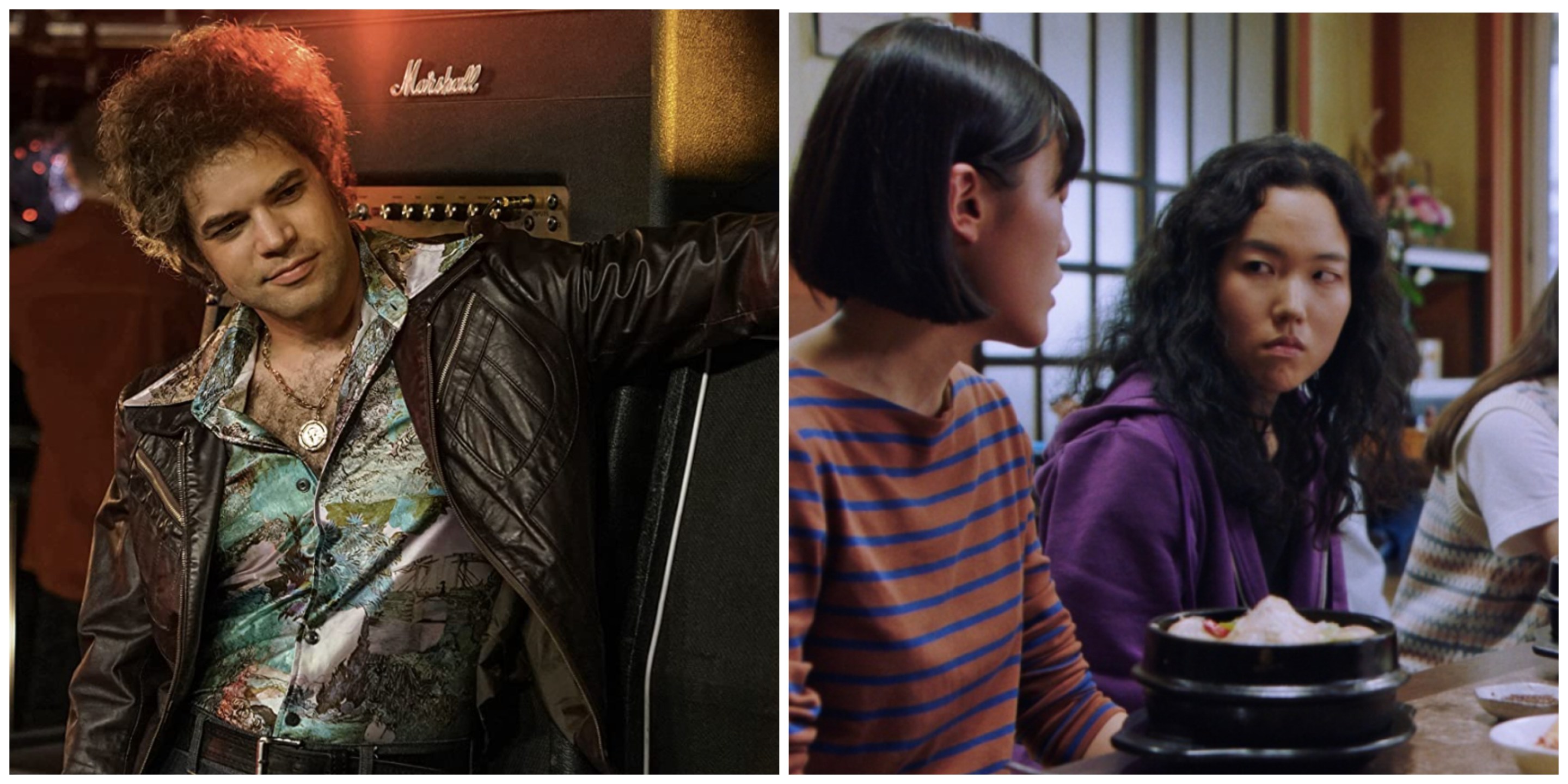I stopped jotting down dialogue that made my eyes roll about halfway through Spinning Gold, but then I couldn’t resist and started up again a few minutes later.
“Clearly you like to gamble.” “I like to win.”
“We never lied about the music.”
“Beth was right. She just had no idea how right she was.”
“You do know no one’s ever done this before.” “That's because no one ever tried before.”
“We’re gonna place one final bet.” “On who?” “On us!”
You get the idea.
Dishonestly billed as “the story of Casablanca Records,” Spinning Gold is actually a biopic of Neil Bogart, the music bizzer who broke Donna Summer, Parliament, Bill Withers, Kiss, and the Village People. Produced, directed, and written by his son, Timothy Scott Bogart, with the assistance of another son, Quinn Scott Bogart, and with two more Bogarts listed among the truly impressive 22 executive producers, Spinning Gold is best viewed as a belated Father’s Day gift. Or a posthumous vanity project. Or not at all.
Not that Bogart doesn’t deserve recognition. He was a colorful record man with good ears who was willing to take risks for acts that the music-buying public wasn’t quite ready for. And he was never afraid of a good showbiz gimmick. But that doesn’t mean anyone unrelated to the guy cares much about his boyhood in Queens, or about his relationship with his dad (Jason Isaacs) or his wife (Michelle Monaghan) or his girlfriend (Lyndsy Fonseca). And it sure doesn’t mean glib Broadway star Jeremy Jordan can convince us otherwise, especially not with that hair. (Even before we get to the ’70s, Spinning Gold is already flaunting the worst wigs and facial hair of any movie this side of Argo.)
Characters exist in Spinning Gold only in relation to Bogart. As Beth Bogart, poor Monaghan gets the worst of it: She has to make goo-goo eyes at Jordan as a teenybopper, ask besottedly “Where do we dream from here?” once they’re married, and then sit at home alone after he starts hooking up with Kiss’s sexy little manager. Eventually she walks out his life—and the movie, though Bogart is so haunted by Kiss’s “Beth” he won’t release it as a single. (That part’s actually true.) As Joyce Biawitz, Fonseca then takes over the role of assuring Bogart he’s a genius. To her credit, her character not only occasionally seems like an actual person, but she's the only actor here who pulls off the period fashions.
Sebastian Maniscalco’s Giorgio Moroder seems to have wandered over from the set of House of Gucci, while as Bogart’s partner, Cecil Holmes, Jay Pharoah mostly just stands around until he has to tell Neil that this time he has gone too far. Demanding a cool million for a spaceship, Wiz Khalifa at least has some fun as George Clinton, as he damn well better; he also introduces Bogart to cocaine, like he wouldn’t have gotten around to it eventually on his own. The drugs are a problem until, at some point, they suddenly aren’t. The morality of payola is brushed aside.
The film so overstates Bogart’s role in the music he released that it’s hard to give him credit where it’s due. Yes, he was the guy who insisted that “Love to Love You Baby” should stretch to 17 minutes. But we also watch Neil teach the Isleys to be funky, Gladys Knight to be soulful, the Village People how to dance, and Donna Summer to be sexy.
“Every single bit of this story was true; even the parts that weren’t,” Jordan-as-Bogart all but winks early on, just after we’ve watched him hand out stacks of cash to Edwin Hawkins as the choir sings “Oh Happy Day.” But there’s apocryphal and then there’s totally fabricated, and at times Spinning Gold deserves a film review less than it does a once-over from PolitiFact. Did Berry Gordy arrange a gang hit on Bogart after the latter snaked the Isley Brothers away from Motown? Possible, I guess. Did two disco babes handcuff WBLS’s Frankie Crocker to a bathroom wall while Bogart glued “Love to Love You Baby” onto the radio station’s turntable? Pants on fire!
That’s too bad because there are some interesting ideas about the music business at the heart of this mess: About how Jewish kids elbowed their way into the biz, about their complicated relationships with Black musicians, or for that matter about how the success of the music we love relies on hucksters doing the dirty work. But that’s a lot for a jukebox musical to chew on.
Ultimately, the movie’s success rests on whether you find Jeremy Jordan charming… and if you do, may I ask why? Granted, the script kneecaps him. This is the kind of movie that gives its lead character a character trait (here, a love of gambling) and then forces a related metaphor into every conversation. But Jordan hammers on that one note as Bogart—you get more of a sense of why so many people believed in the guy from a short Merv Griffin clip shown during the credits than from anything that came before. And the finale is truly gruesome: Dying young, Bogart duets on “Last Dance” with Donna Summer before heading off into the white light, then returns to sing a song the Bogart boys wrote ‘specially for the occasion.
All of which might be slightly forgivable if we got to hear the real music instead of mere remakes. Even when Ledisi, Pink Sweat$, and Jason Derulo turn in capable Gladys Knight, Bill Withers, and Ronald Isley impressions, it’s just not the same. And Tayla Parx just can’t channel the pop alchemy that made Donna Summer unique—the actress captures the choir upbringing but not the European musical theater clarity that refined it, and she gives in to all-too-modern melismatics.
Spinning Gold has been in the works for over a decade—originally Justin Timberlake was cast as Bogart, and Spike Lee, who would certainly have put a different spin on the movie’s iffy racial politics, was set to direct. Now, at long last, the movie exists, and it’s evidence, I guess, that Neil Bogart was right: You truly can accomplish anything you can dream if you just never give up. Too bad that the movie is also proof that some dreams are worth giving up on.
Freddie Benoit has a resting brat face. She’s in her mid-twenties when Return to Seoul begins, and her overall vibe is skeptical if not cynical, in that way young adults, with their premature knowingness, can come across as even more adolescent than actual teens As played by remarkable newcomer Park Ji-Min, her mouth downturns into a sullen pout, as though of its own accord. Freddie has seen through all the adult bullshit of the world, and she’s, like, so bored with it. But then, to alleviate that tedium, she’ll poke her cheek with her tongue and create some mischief of her own.
Freddie is proud of her extemporaneous lifestyle; she compares it to sight reading a piano piece, and she does have an implicit awareness of how to play the scene ahead of her with just a glance. No sooner has she explained this philosophy of life to her new friend Tena (Guka Han), who works at the Seoul hotel where Freddie has just checked in, than Freddie demonstrates how her beliefs play out. With that shift in demeanor I mentioned above, thoughtful insouciance takes over from static peevishness, and Freddie throws an impromptu party in the restaurant where they’re sitting, bringing some outgoing young women over to drink with some less outgoing young men and getting everyone sloshed. All without speaking Korean.
With Return to Seoul, director Davy Chou has made a film that feels just as improvisatory as Freddie’s life—which, like anyone’s life, only makes sense in retrospect. Chou skips years between segments, and, as in like a Seven Up movie, the gaps illustrate how drastically we change over the years. We witness the result of time passing, like when you go years without seeing a friend or relative. Without being evasive, the episodic structure allows us to follow Freddie’s development without feeling every incremental personality shift or life change has to be strictly accounted for.
Freddie isn’t even in Korea on purpose. She’s adopted (she’s been raised in France by white parents) but she hasn’t come to Seoul to find her birth family—she just wound up there after a flight was canceled. Spontaneous as she is, though, once the possibility is mentioned to her, she goes to an agency to uncover her past. Here she learns her birth name, Yeon-hee (which translates as “docile and joyous”), and she also learns that her birth mother is not responding to attempts to reach her.
Her birth father (Oh Kwang-rok), however, is eager to meet her, and he turns out to be a drunken nightmare. His guilt over giving his baby daughter away has curdled into an oppressive neediness that he inflicts on Freddie. Since he can’t do anything to change the past, he wants her to change the present—her present. And of course, now that he’s found Yeon-hee, he wants her to stay in Korea.
So does the guy Freddie slept with on her first night in Korea. Korean men generally do not come off well here—they’re depicted as clingy and lachrymose, and Freddie, who has no intention of being docile and joyous, does not have a high opinion of Korean woman either. Trapped by the emotions of the men around her, she dances with a frenzy at a club, makes a pass at Tena, and hits on a DJ. She seems certain to flee to somewhere she feels less trapped.
But when we see her again two years later, Freddie is still in Seoul. She’s shed her sloppy postcollegiate look for leather-and-lipstick glam. Her eyes are brighter too, knowing rather than skeptical, like she’s been rewarded for her cynical perspective, and her disappointment with the world turned into a confidence that she can play it. For all her talk about sight reading, Freddie wants to play notes that aren’t on the page.
Freddie’s experience in Korea throughout the film is a polyglot mess. She speaks French with Tena, and broken English with other Koreans. (“You… me… sex?” she asks one guy who can’t believe his luck after they wake up hungover in bed together. “Again?”) When she meets her family, she’s at the mercy of translators, who temper the overemotive comments of her family and soften the edge of her responses.
“How long do you want to stay?” Tena asks at the very start of the movie, when Freddie shows up at her hotel. It’s one of those mundane questions that takes on an existential weight as the film proceeds. Korea is a place for Freddie to recreate herself, but it's also a trap she can’t escape. Return to Seoul insists there are no answers in our origins, just further questions. And it knows those can’t all be answered in a single film. Or a single lifetime.
Spinning Gold and Return to Seoul are now showing in area theaters.
GRADES
Spinning Gold: C-
Return to Seoul: A-






